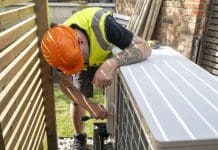Only 5,600 of the expected 82,500 jobs were created under the Green Homes Grant voucher scheme and £314m of the £1.5bn has been spent, according to a new report by the National Audit Office (NAO)
The Green Homes Grant voucher scheme was delivered to an over-ambitious timetable and was not executed to an acceptable standard, significantly limiting its impact on job creation and carbon reduction, says the NAO.
As part of Government’s ‘green recovery’ from the Covid-19 pandemic, the Department for Business, Energy & Industrial Strategy (BEIS) ran the Green Homes Grant Voucher scheme.
The scheme offered homeowners up to £5,000 funding, or £10,000 for low-income households, for the installation of energy efficient improvements.
What went wrong?
BEIS originally expected the scheme to support up to 82,500 jobs over six months, and enable up to 600,000 households to save up to £600 on their energy bills. The Green Homes Grant scheme did not deliver the expected number of energy efficiency home installations or support the expected number of jobs.
In total, the BEIS estimates that it will spend £314m of the £1.5bn funding available, of which £50.5m (more than £1,000 per home upgraded) is on administration.
It forecasts that the scheme will eventually support efficiency measures in 47,500 homes and create up to 5,600 jobs over 12 months.
Many homeowners and installers had a poor experience using the scheme. There were delays in issuing vouchers to homeowners and paying installers, causing frustration.
Homeowners also found it challenging completing applications, and were often asked for more information, which took time.
From October 2020 to April 2021, over 3,000 complaints were made to the BEIS and the scheme administrator.
HM Treasury gave the BEIS an over-ambitious 12-week timescale to design the Green Homes Grant scheme, consult with stakeholders and procure an administrator, says NAO. This came at a time when the department was supporting vaccine procurement and undertaking activities related to EU Exit.
The BEIS accepted that delivering the scheme within this timescale posed a high risk, but judged it was justified by the need to support businesses in the wake of Covid-19.
The department did not sufficiently understand the challenges facing installers, failing to learn from its own previous energy schemes. The BEIS only consulted with installers after the scheme was announced, which limited the opportunities to include installer views in the scheme design. The costs of installer accreditation and the short duration of the scheme when it was first announced deterred some installers from participating.
Recommendations
The NAO recommends the BEIS should engage properly with the supplier market for future decarbonisation schemes, and base its planning on a realistic assessment of how long it will take the market to mobilise.
The requirements placed on homeowners and installers for such schemes should be tested from the start, with the aim of simplifying administration.
Gareth Davies, head of the NAO, said: “The aim to achieve immediate economic stimulus through the Green Homes Grant voucher scheme meant that it was rushed.
“As a result, its benefits for carbon reduction were significantly reduced and ultimately, it did not create the number of jobs government had hoped for.
“Decarbonising our homes is a key element of the government’s net zero strategy. It is vital that future schemes learn from this experience.”
Industry reaction
Andrew Baldwin, head of public affairs at APM, said: “Sadly, this will all sound far too familiar to some project professionals; it seems apparent now that the potential benefits were either unachievable or unrealistic. Either way, there are questions about project realisation.
“The NAO report highlights multiple issues with the scheme including a far too ambitious time scale (a 12 week turnaround), a lack of long term commitment and a failure to learn from previous projects.
“But was it set up to fail as has been suggested this morning? Seen in the context of Covid-19, where departments were encouraged to do something, anything, to help boost economic growth, it was probably right to attempt to do something. And the original aims and objectives were encouraging –we must support and inspire more efficient home upgrades to achieve the Government’s net zero ambitions.
“It’s likely there will be a lot more government projects of this nature in future – net zero will demand an ambitious programme with a number of quick win projects. In order to deliver this ambition, net zero projects must be long term in nature, properly resourced and well thought through.”

















